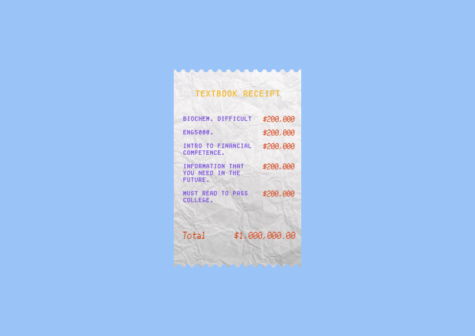OPINION | Tulane textbook costs inflate already pricey tuition

A Tulane University student may pay up to $60,814 per year in tuition, not including housing, meal plans and other fees, which can add an additional $19,000 to $20,000. Tulane charges $80,000 per student for total costs, which is significantly higher than the $54,880 average cost of attendance for private universities.
With access to a significant amount of money just from tuition alone, it is ridiculous that students and their families are still required to pay for textbooks with no options for easily accessible subsidization.
Tulane estimates the average cost of textbooks to be $1,200 per year. This cost can include paid access for homework, media and other texts that are imperative for a student’s success in a class. When students and families already shell out $80,000 a year for Tulane, it is burdensome to ask them to pay extra for the required homework in a class or $1,200 for textbooks. The cost of textbooks may initially seem trivial, but after four years, $4,800 puts a serious dent in a checkbook.
It can be unclear which textbooks are actually worth purchasing, especially this semester as many professors have had to alter their courses to accommodate for Hurricane Ida. Purchasing textbooks can seem like a waste of money at the end of the semester when students realize that the textbook was practically useless. Experienced students may resort to online community platforms like ratemyprofessor.com to see if a textbook is truly necessary for a class. Those who are not familiar with resources like this take a gamble when buying the full textbook list.
On top of being expensive and potentially useless, purchasing physical textbooks is also outdated. Advancements in technology constantly change what resources are necessary for the modern college experience. At a time where professors have the ability to transfer all their materials to online platforms, it seems almost ancient that we are still required to purchase paper copies of texts.
Utilizing online textbook platforms would allow students to only pay for and access the texts that are deemed imperative for their classes, while still giving students who learn more effectively from physical texts the option to purchase them. This resolution prevents students from purchasing textbooks that they will never use while preventing excess paper usage.
A virtual approach is proving to be very effective at Arizona State University where they are deploying virtual document management technologies. As of now, 150,000 documents are in ASU’s system. While it is unclear how many of these documents are textbook materials, ASU’s system suggests that a widespread effort to consolidate paper materials is both practical and achievable.
When the cost of attending Tulane is so expensive, there is a huge accumulation of money for the administration, given that Tulane’s undergrad population is around 8,000 students. The cost of textbooks is significant for students but almost negligible for the school. Subsidizing or discounting textbook costs would cause a minor income difference for the school.
Tulane students appreciate the little luxuries our tuition provides us with: a pasta bar in the commons, a beautiful business school building and weekly room cleanings for on campus residents. However, it would benefit the student body much more if the school covered all or part of textbook costs, which are necessary components of our college education.
If a higher education institution aims to educate the student body to the best of their ability, then why is one like Tulane not providing the students with the most basic tool they need to achieve this goal?
Your donation will support the student journalists of Tulane University. Your contribution will allow us to purchase equipment and cover our annual website hosting costs.


